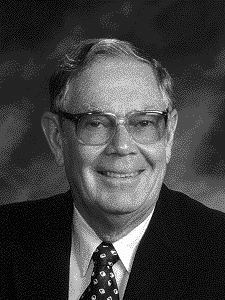 1929-2007
1929-2007
Eric Bradford’s interests in animal agriculture began while growing up on a small, mixed farm in Quebec Province, Canada. He was a graduate of Macdonald College of McGill University with a BS degree with honors in agriculture (1951). He was awarded his MS (1952) and PhD (1956) degrees with a joint major in genetics and animal husbandry from the University of Wisconsin.
He joined McGill University as assistant professor in 1955, but moved to the Animal Husbandry department (later named the Department of Animal Science) at the University of California-Davis in 1957, rising through the ranks to professor in 1969. His career included sabbaticals at Cornell University, the Agricultural Research Council (Edinburgh, Scotland), and Winrock International, a global nonprofit organization that addresses rural development and sustainable resource management through education and empowerment programs.
Bradford taught courses in animal breeding and genetics, beef cattle and sheep production, animal growth, and also general animal science, educating numerous undergraduates over the years. His research spanned reproduction and growth in livestock and laboratory (mice) animals; sheep breeding; animal genetic resources conservation; and international agriculture. Over the course of his career, he published more than 150 journal articles and book chapters, with an additional 60 general publications. He served as major professor for 11 PhD and 14 MS students from 12 countries, and he remarked that these students were a major stimulus to his interest in international agriculture.
Bradford was dedicated to service and held administrative posts at the University of California-Davis, including associate dean (College of Agricultural and Environmental Sciences, 1969 to 1970), department chair (Animal Science, 1973 to 1978 and 1990 to 1992), and genetics graduate group chair (1986 to 1989). He was editor of the Breeding and Genetics section of the Journal of Animal Science (1979 to 1980) and a member of the editorial board (1990 to 1993); he was on the editorial board of the Sheep and Goat Research Journal for 13 years (1990 to 2003) and was principal investigator of the small ruminant collaborative research support program, with projects in Kenya, Indonesia, and Morocco.
Bradford was a valued member of professional societies and held honors and awards related to his activities, including the American Society of Animal Science (ASAS) Rockefeller Prentice Memorial Award for Research in Animal Breeding and Genetics, the ASAS Bouffault Award in International Animal Agriculture, the Western Section of Animal Science Distinguished Service Award, the California Wool Growers Association Order of the Golden Fleece Award for service to the California sheep industry, and the Award of Distinction from the University of California-Davis College of Agricultural and Environmental Sciences (2000). He was also a Fellow of the American Association for the Advancement of Science and the ASAS.
He retired from the university in 1993 but remained active in academic endeavors.During retirement, he chaired an international global task force on “animal agriculture and the global food supply” as well as 2 committees responsible for the planning that led to establishing the University of California-Davis Agricultural Sustainability Institute in 2005. His consistent and long-held optimistic belief in the value and contribution of animal agriculture to society was the basis for his passion for the concepts of agricultural sustainability.
He was a member of the USDA National Animal Germplasm Program small ruminant committee, the Stanford University committee on consequences of industrial animal production, and a member of the centennial committee of the ASAS.
He found great satisfaction in activities associated with the International House-Davis chapter, where he was a member of the board of directors (1993 to 1998, 2002 to 2007) and served as vice president (2002 to 2004) and president (2004 to 2006).
In May 2007, Bradford’s contributions and service to the University of California-Davis were recognized and celebrated with family, friends, and colleagues with the dedication of the Bradford Conference Room in Meyer Hall.
On August 29, 2007, Bradford died unexpectedly of heart failure. He is survived by his wife of 53 years, Elizabeth, daughters Anne Harris, Margaret Aumann, and Ellen Javete, son Ken, and 6 grandchildren. Bradford was a scholar with a wry sense of humor; he leaves behind a cohort of colleagues in the United States and around the globe who will miss his counsel and consideration.
